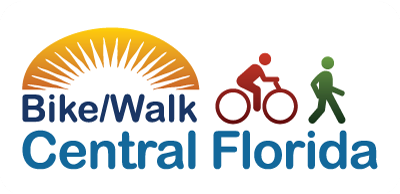
Bike 5 would not be possible without Winter Park, Eatonville, Casselberry, Maitland and Orlando – the five municipalities that serve as hosts for the event. Each of these cities have made significant strides towards becoming pedestrian and cyclist friendly, and we are grateful for their partnership.
Take a look at how each host city is working to create a more bicycle-forward community:
- Orlando has a bicycle network of over 45 miles of off-street trails, 50+ miles of signed routes and over 265 miles of bicycle lanes. In 2008, Orlando adopted a Bicycle Plan, including design guidance, policy and program recommendations, and overall bicycle infrastructure improvement strategies, which has led to an increase in ridership. A multiuse trail project, the Downtown Loop, is also currently in the works for the city. The trail will create an 8.5-mile car-free route through the greater downtown area, providing access to shopping, dining, entertainment, parks, offices, and services. With three projects currently in the works, the Downtown Loop is making significant progress towards closing gaps in Downtown Orlando’s bicycle and pedestrian infrastructure. As a step towards achieving its goals of connectivity and safety, the city recently decided to make the Bike 5 route signage permanent, with plans of having it installed by the seventh annual event in 2024.
- As a hot spot for Central Florida residents and visitors, Winter Park has made it a priority to improve its transportation network. Through the implementation of the Pedestrian & Bicycle Spot Improvement Program, the city has enhanced its street system to become more pedestrian and bicycle friendly. This has been achieved through surface improvements, signing and striping, access improvements and bike rack installations. With a commitment to being a pedestrian and bicycle friendly community, Winter Park continuously looks for new ways to improve mobility and safety for non-motorists, including the completion of the new Denning Drive multiuse trail and the extension of that trail, slated for construction in the next few years. The city also created the Transportation Advisory Board, which gives residents an opportunity to work with city staff to improve transportation throughout Winter Park.
- Adopted in March of 2019, The City of Maitland’s 2035 Comprehensive Development Plan set the goal of implementing more multimodal transportation solutions throughout the city. Maitland has a growing network of biking paths intended for both recreational riders and commuters, and as such, has placed bike route signs along roads, paths, and trails to improve cyclist safety. The five-mile Maitland Bike Loop travels through five city parks, as well as commercial and residential areas, while the East-West Connector links Sandspur Road with a pedestrian-bicycle bridge that crosses I-4, connecting the east and west sides of the city.
- Eatonville has worked with local organizations to help educate the community about safe and sustainable transportation. Some of these efforts include helmet fittings, bike rodeos and other community rides throughout the year. These community rides often feature segments of the Bike 5 route that runs through Eatonville and it showcases bike friendly streets to participating residents. In 2022, Eatonville partnered with the City of Winter Park to enhance the safety of infrastructure for the students at Hungerford Elementary School, ensuring they could safely walk and bike to school. The Hungerford Safe Routes to School Project involves the installation of widened sidewalks on both sides of the street, as well as the implementation of crosswalks and rapid flashing beacons.
- The bicycle-friendly Casselberry Greenway was designed to connect the city’s neighborhoods, schools, and parks. And it’s only the beginning: The Casselberry Multimodal Transportation Master Plan aims to further improve sidewalks, trails, and overall transportation infrastructure within the next 10 years. The City of Casselberry made it their mission to be the most walkable, bikeable and rollable city in Central Florida by 2040, a goal they are already miles ahead on. One of the improvements already implemented as part of the plan is the installation of “sharrows,” or shared lane markings on roads to indicate shared use by bicycles is allowed. The sharrows not only guide cyclists through safe routes, but also warn motorists to expect and respect the cyclists so that they can share the road safely. The City is also making strides in completing multiple complete street projects that include wide buffered bike lanes, shared use paths and show and shared streets throughout the City. Cyclists can expect to see Bike 5 signage throughout Casselberry, as they recently made it permanent for cyclists to use as a guide year-round.

2022 Bike 5 Orlando group photo.
The commitment of our host cities, Winter Park, Eatonville, Casselberry, Maitland, and Orlando, has been instrumental in Bike 5’s continued growth and success. These municipalities are dedicated to creating pedestrian and cyclist-friendly communities year-round, advocating for improved bike infrastructure and encouraging policymakers to embrace it. They recognize that the Bike 5 route has the potential to evolve from a one-day ride into a regular mode of transportation or leisurely travel for both residents and visitors. We are excited about the progress each of these cities continues to make in creating a healthier and more bicycle-forward Central Florida, and their ongoing efforts ensure that the mission of Bike 5 extends far beyond the annual event.
To learn more about our upcoming Bike 5 event or to register, visit https://bikewalkcentralflorida.org/bike5/.

